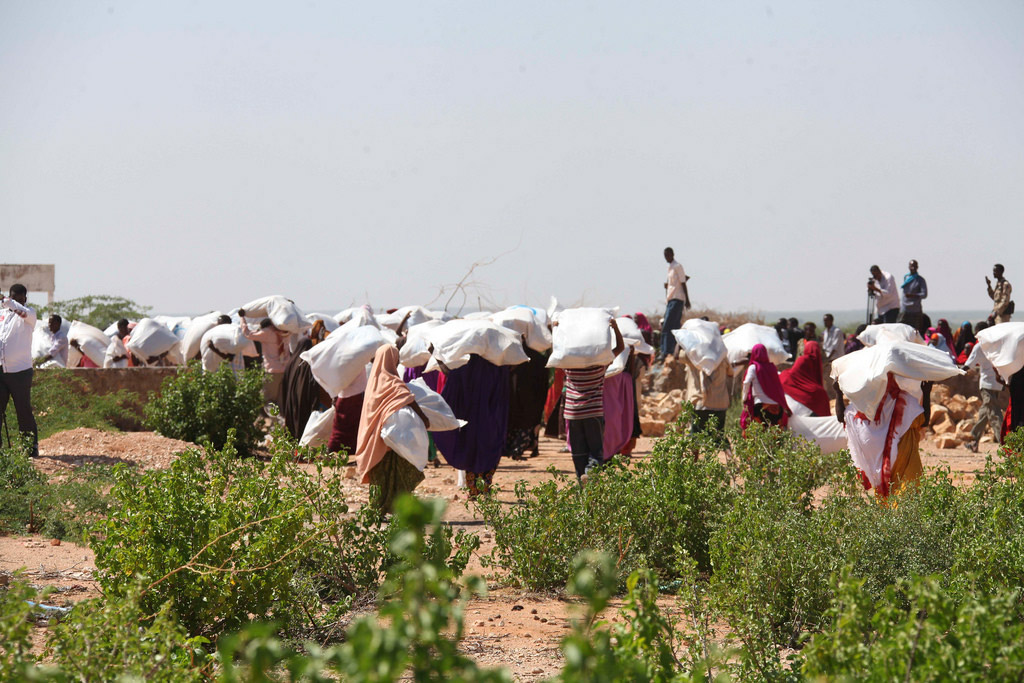The UN Humanitarian Coordinator for Somalia, Philippe Lazzarini, said in a statement issued in the Somali capital, Mogadishu, that about 730,000 Somalis face acute food insecurity, the vast majority internally displaced people (IDPs), while another 2.3 million people are at risk of sliding into the same situation.
“This brings the number of people in need of humanitarian and livelihood support to 3 million,” he explained, reacting to new assessment findings released today by the Food Security and Analysis Unit, managed by the UN Food and Agriculture Organization (FAO), and the Famine Early Warning Systems Network.
He noted that there had been improvements in some parts of the country, but the southern and central regions continue to be the epicentre of the crisis.
“Malnutrition rates remain stubbornly high with nearly 203,000 acutely malnourished children requiring emergency nutrition” mainly due to lack of access to clean water, sanitation infrastructure and better hygiene, Mr. Lazzarini said. “About 38,000 children are severely malnourished and need life-saving medical treatment and therapeutic food.”
Valuable support from donors has allowed for a timely scale-up of humanitarian emergency response and the worst impact of the crisis has been mitigated, especially in the second half of 2014, but he underscored that available funding is not commensurate to the needs.
In 2015, the Humanitarian Response Plan requests $863 million to save lives, improve protection of displaced people and provide durable solutions, and strengthen resilience of communities to withstand shocks.
“It is an essential prerequisite to continue to do everything we can to address the current humanitarian needs to prevent the relapse of a major crisis jeopardizing recent historic peace and state building gains,” the humanitarian coordinator said.
Also on Somalia today, the Secretary-General’s Special Representative, Nicholas Kay, today welcomedthe Somali Government’s announcement to nominate a new Federal cabinet.
Mr. Kay stressed that once approved by the Parliament, the Federal Government will need to address Somalia’s state and peacebuilding goals urgently. He added that the UN is committed to support the process.
FRENCH VERSION
Le coordinateur humanitaire des Nations Unies pour la Somalie,Philippe Lazzarini, a déclaré dans un communiqué publié dans lacapitale somalienne, Mogadiscio, auxquels environ 730 000Somaliens sont confrontés à l’insécurité alimentaire aiguë, lesgrande majorité déplacés internes (PDI), alors qu’un autre 2,3millions de personnes courent le risque de sombrer dans lamême situation.
“Cela porte le nombre de personnes nécessitant une assistancehumanitaire et les moyens de subsistance de 3 millions,” a-t-ilexpliqué, réagissant aux nouveaux résultats de l’évaluationpubliés aujourd’hui par la sécurité alimentaire et l’unité del’analyse, géré par la FAO et l’Agriculture (FAO) et le réseau desystèmes d’alerte précoce de Famine.
Il a noté qu’il y avait eu des améliorations dans certaines partiesdu pays, mais les régions méridionales et centrales continuentd’être l’épicentre de la crise.
« Les taux de malnutrition restent obstinément élevés avecpresque 203 000 enfants souffrant de malnutrition aiguënécessitant une nutrition d’urgence » principalement en raisonde l’absence d’accès à l’eau propre, des infrastructures sanitaireset meilleure hygiène, a dit M. Lazzarini. « Environ 38 000 enfantssont gravement sous-alimentés et ont besoin de soins médicauxvitaux et des aliments thérapeutiques. »
Précieux appui des donateurs a permis une intensification en temps opportun de l’aide humanitaire d’urgence réponse et lespires effets de la crise a été atténué, surtout dans la secondemoitié de 2014, mais il a souligné que les fonds disponibles nesont pas proportionnée aux besoins.
En 2015, le Plan d’intervention humanitaire demande $ 863millions pour sauver des vies, améliorer la protection despersonnes déplacées et fournir des solutions durables etrenforcer la résilience des collectivités à résister aux chocs.
« C’est une condition indispensable de continuer à faire tout que notre possible pour adresse que l’humanitaire actuel doitempêcher la rechute d’une crise majeure mettant en danger lapaix historique récent et state building gains, » a déclaré lecoordonnateur humanitaire.
Également sur la Somalie aujourd’hui, représentant spécial duSecrétaire général, de Nicholas Kay, a salué aujourd’hui annoncepar le gouvernement somalien pour désigner un nouveau cabinetfédéral.
M. Kay a souligné qu’une fois approuvé par le Parlement, legouvernement fédéral devra attaquer l’État et la consolidationdes objectifs d’urgence de la paix en Somalie. Il a ajouté quel’ONU s’engage à soutenir le processus.



